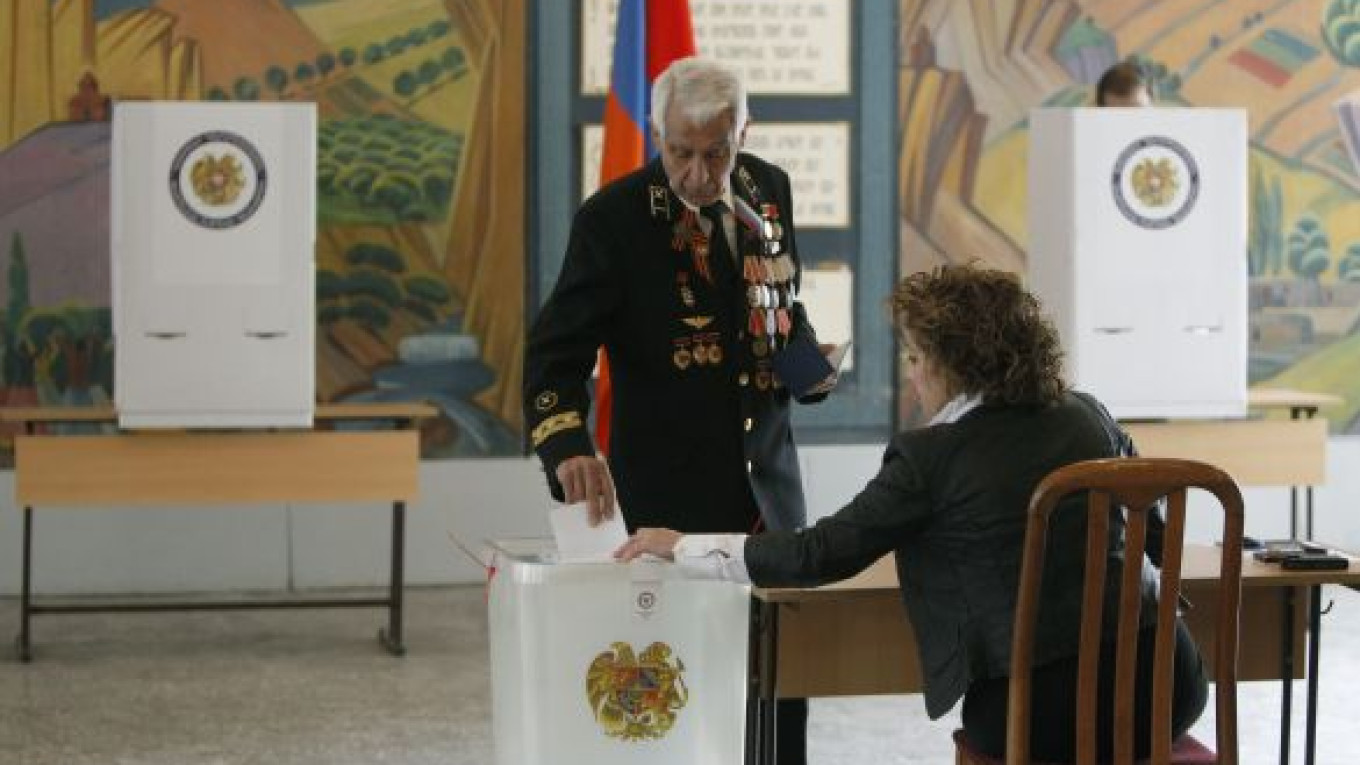YEREVAN, Armenia — Armenians voted in a presidential election on Monday that is set to hand incumbent Serzh Sarksyan a new five-year term, but the lack of any serious opposition and an assassination attempt on one of his rivals cast a shadow over the ballot.
Opinion polls suggest Sarksyan's victory is all but certain. He is on target to win more than 60 percent of the vote in the small, landlocked country in the South Caucasus, one of Russia's strongest allies in the region.
Sarksyan hopes a vote free of the violence and fraud that marred the last presidential poll in 2008, when 10 people were killed in clashes, will show that the country is on the path to economic recovery after years of war and upheaval.
Political stability in a region where pipelines take Caspian oil and natural gas to Europe is also a concern for foreign investors and neighbors.
Casting his own ballot at a polling station in the capital of Yerevan, Sarksyan said: "I voted for the future of Armenia, for the security of Armenia, for the security of our citizens."
It is a message that has resonated with many voters in the country of 3.2 million, where more than 30 percent of the population live below the poverty line, the average monthly salary is about $300 and unemployment was 16 percent in 2012.
"Sarksyan promotes the improvement of educated society, which is a guarantee of Armenia's future," said Artak Avetsyan, 31, a teacher who came to cast his ballot for the incumbent.
But with none of Sarksyan's serious opposition rivals choosing to stand, election observers expressed concerns over the democratic credentials of the vote.
Officials from the Parliamentary Assembly of the Council of Europe (PACE) said they found apathy toward the vote and a lack of confidence about the electoral process among the public when they visited the country in January.
Questions also linger over security in a nation locked in a dispute with neighboring Azerbaijan over Nagorno-Karabakh, an ethnic Armenian-majority enclave inside Azerbaijan over which Armenians and Azeris fought a war in the 1990s. Sarksyan, 58, like many of his generation, is a veteran of that war.
The threat of a conflict over Nagorno-Karabakh also remains.
Sarksyan has accused Azerbaijan of threatening a new war. Baku denies it is the aggressor in the conflict and says Armenia should hand back control of Nagorno-Karabakh.
Security concerns were underlined by an attempt to kill Paruyr Hayrikyan, 63, an outsider in the election. He was shot in the shoulder on Jan. 31.
Another dark horse in the race, Andrias Ghukasyan, has been on a hunger strike since the start of the campaign to press demands for Sarksyan's candidacy to be annulled and for international observers to boycott the vote.
A third candidate, Arman Melikyan, has said he will not vote because he believes the election will be skewed in Sarksyan's favor. Other potential rivals chose not to take part in the race for similar reasons.
Polls show Sarksyan's closest challenger is U.S.-born, ex-Foreign Minister Raffi Hovannisian. He is predicted to win 11-20 percent of the vote.
Observers from PACE have called the absence of any strong rivals to Sarksyan "a matter of great concern."
"Major political parties, which were strongly expected to present presidential candidates, chose not to do so because of their lack of trust in the conduct of the election," they said.
Sarksyan's supporters dismiss the concerns, saying the election is a step toward greater democracy.
He has focused his campaign on the economy, which collapsed in the chaos that followed independence in the 1990s when 30,000 people were killed in the war over Nagorno-Karabakh.
Official results are expected Tuesday evening.
Related articles:
A Message from The Moscow Times:
Dear readers,
We are facing unprecedented challenges. Russia's Prosecutor General's Office has designated The Moscow Times as an "undesirable" organization, criminalizing our work and putting our staff at risk of prosecution. This follows our earlier unjust labeling as a "foreign agent."
These actions are direct attempts to silence independent journalism in Russia. The authorities claim our work "discredits the decisions of the Russian leadership." We see things differently: we strive to provide accurate, unbiased reporting on Russia.
We, the journalists of The Moscow Times, refuse to be silenced. But to continue our work, we need your help.
Your support, no matter how small, makes a world of difference. If you can, please support us monthly starting from just $2. It's quick to set up, and every contribution makes a significant impact.
By supporting The Moscow Times, you're defending open, independent journalism in the face of repression. Thank you for standing with us.
Remind me later.


